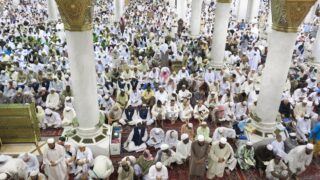Nafilah is a word imbued with beauty and meaning, and no matter how much was said about its interpretation and its essence, one of its meanings is that of increase and addition. In terms of Islamic Sharia, it means supererogatory acts of worship in addition to the obligatory amount (in Arabic, it is: fard) of its same kind.
Some people think that Nafilah is limited to prayers, but the truth is that in any act of worship, there is the obligatory and the supererogatory. Prayer has its nafilah, zakah has its nafilah, fasting has its nafilah, and even pilgrimage has a nafilah.
It is indeed one of the amazing aspects of Islam to obligate the minimum required — the fard — in every act worship, then encourage additions and leave the door open to increase with no limiting boundary. Thus, the door is open for soaring, and the horizon is vast for those who wish to fly, so where are the ambitious? How heedless are those who forsake the Nafilah and confine themselves to the obligatory!
They are renouncing the overwhelming generosity that Almighty Allah has promised those of His servants who seek closeness to Him with nafilah. The heedless, on the other hand, forget that they are certainly not free of shortcomings in their performance of the obligatory or falling into sins, and so are in need of these additions with which to make up for the shortcomings.
In the Qur’an, Almighty Allah says,(Lo! Good deeds annul ill-deeds. This is reminder for the mindful.) (Hud 11:114)Indeed, beneath this Nafilah are great meanings and implications grasped only by those whom Allah has given insight and removed the covering caused by sin off their hearts. Each Nafilah has lights and revelations that would override in their power the light of the sun.
Recently, however, an attitude has spread among many Muslims that they pay little heed to nafilah. So, if you tell one of them to pray two rak`ahs after Zhuhr Prayer (Arabic for: Noon Prayer), he or she says, “It is a sunnah (not obligatory)!” And if you tell such a person to fast the day of `Arafah, he also says, “It is a sunnah!
This answer and similar ones give the feeling that for this Muslim, sunnah means something that he or she is not required to seek and can readily refrain from. This implies a terrible ignorance of sunnah, its reality, and function as well as the secrets and fruits of nafilah.
Secrets and Benefits of Nafilah
Nafilah is a shield that protects the obligatory acts from being weakened, since a person who keeps Nafilah will be more careful to keep the obligations. In contrast, those who easily discount them will, if laziness takes over, neglect the obligations as well, Allah forbid.
Satan always drives one to leave the Nafilah first, with excuses of it being not obligatory, and once he succeeds in this, he takes a step further with this person. In this way, such a person can be deceived into following Satan’s insinuations.
Thus, Nafilah is a proof that the obligatory acts are maintained, well-observed, and unlikely to be neglected. One who is careful to do the Nafilah will be even more careful to do the obligations.
Nawafil are supporters, since on the Day of Judgment they will make up for whatever shortcomings or defects in the obligatory worship; defects that do not nullify the act of worship. For example, for a person who has a broken bone, a splint is placed to restore the bone to its normal state. In the same manner, Nafilah makes up for the deficiency and fixes the flaws. This is related in a hadith,
“The first thing people will be accountable for on the Day of Judgment is Prayer. Almighty Allah will say to His angels (even though He already knows), “Look at My servants’ Prayers. Were they complete or not?” If they are complete, they will be written as complete. If they are not complete, Almighty Allah will say, “See if My servant has voluntary Prayers.” If he or she has them, Almighty Allah will say, “Complete his obligatory-Prayer shortage with his or her voluntary Prayers.” Then the rest of his or her deeds will be dealt with in the same manner.” (Ahmad, Abu Dawud, and An-Nasa’i)
Therefore, since people’s deeds are never free of a defect, decrease, or forgetfulness, they need to perform Nafilah so as to make up for these failures. Some knowledgeable scholars and pious worshipers went even further and held that these additions to obligations are in fact not “additions” except in the case of Prophet Muhammad (peace and blessings be upon him) whose behavior, worship, and manners have reached human perfection that Almighty Allah has ordained for him. They consider Nafilah to be additional acts of worship done by the Prophet, yet as for others, they need them for expiation of their sins and compensation for what is lacking in their obligatory worship.
According to their view, this meaning is referred to in the Qur’anic verse,(And during a part of the night, pray Tahajjud [Arabic for: optional late-night Prayer] beyond what is incumbent on you; maybe your Lord will raise you to a position of great glory.) (Al-Israa‘ 17:79)
Nafilah is a proof of true loyalty to Almighty Allah. It is known that humans naturally lean toward rest, so what would make a person’s side forsake his or her bed to spend the cold Winter nights in worship while most of the others are asleep? It is indeed the longing for the good pleasure of Allah and the comfort they find in relying on and drawing closer to Him; it is the lights that He bestows on them.
Hence, Nafilah proves and plainly indicates that a servant who tastes the sweetness of worship, does not find them burdensome and realizes their effect on his or her worldly life and its fruit in the Hereafter. It is doubtless that those who do many nafilahs of prayer, for example, prove that they enjoy this intimate conversation with their Creator and understand the meaning of standing before the Lord of all worlds. If it had not been for this, they would not have increased their Nafilah given that it is not obligatory and that they won’t be deemed sinful for leaving it.
Nafilah is a sign that the believer wishes to get closer to Almighty Allah. This moves him or her to an elevated rank, the rank of being a “beloved.” It is not enough to love — so many are the people who love without being loved —; it is more superior to be loved. Such love is referred to in a Qur’anic verse,(A people whom He [Allah] loves and who love Him.) (Al-Ma’idah 5:54)
Almighty Allah has made Nafilah a reason for becoming loved. This is related in the hadith qudsi narrated by Al-Bukhari on the authority of Abu Hurairah. Prophet Muhammad (peace and blessings be upon him) said, Almighty Allah says: “Whoever holds animosity toward one of my beloved servants has launched war against me. And my servants would never seek my closeness with anything better than what I made obligatory for them. And my servant continues to draw closer to Me with Nafilah until I love him. (Al-Bukhari)
Nafilah is a wide source for making gains and collecting great rewards with no limits or boundaries. It is a wonder that some people never have enough of worldly gains, but they disregard gains for the Hereafter. A wise person, however, works for his or her Afterlife as if he or she will die tomorrow; he or she takes provisions for a long inevitable journey, and Nafilah is indeed among the best provisions and preparations.
Nafilah is a means to keeping constant communication with Almighty Allah and living hour by hour in His obedience and under His protection. A Qur’anic verse reads,(And keep up the prayer for My [Allah’s] remembrance.) (Ta-Ha 20:14)
Finally, I advise you — myself included — to be keen on performing as much as you can of nafilah. May Allah shower us with His mercy and grace. Indeed, Almighty Allah is the Most Generous, the Exalted. Remember this hadith qudsi:”If my servant comes closer to Me a hand span, I come closer to him or her an arms-length; and if he or she comes to Me walking, I come to him or her running.” (Al-Bukhari).
By Mohammed Zidan


















